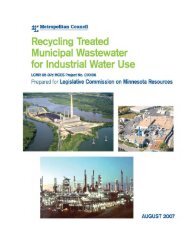Chapter One Federal Government - Minnesota State Legislature
Chapter One Federal Government - Minnesota State Legislature
Chapter One Federal Government - Minnesota State Legislature
You also want an ePaper? Increase the reach of your titles
YUMPU automatically turns print PDFs into web optimized ePapers that Google loves.
<strong>Chapter</strong><br />
Seven<br />
Legacy<br />
<strong>Chapter</strong> Seven Legacy<br />
Sec. 3. Census enumeration apportionment; congressional and legislative district boundaries; senate districts.<br />
At its first session after each enumeration of the inhabitants of this state made by the authority of the United <strong>State</strong>s,<br />
the legislature shall have the power to prescribe the bounds of congressional and legislative districts. Senators shall<br />
be chosen by single districts of convenient contiguous territory. No representative district shall be divided in the formation<br />
of a senate district. The senate districts shall be numbered in a regular series.<br />
Sec. 4. Terms of office of senators and representatives; vacancies. Representatives shall be chosen for a term of<br />
two years, except to fill a vacancy. Senators shall be chosen for a term of four years, except to fill a vacancy and<br />
except there shall be an entire new election of all the senators at the first election of representatives after each new<br />
legislative apportionment provided for in this article. The governor shall call elections to fill vacancies in either<br />
house of the legislature.<br />
Sec. 5. Restriction on holding office. No senator or representative shall hold any other office under the authority of<br />
the United <strong>State</strong>s or the state of <strong>Minnesota</strong>, except that of postmaster or of notary public. If elected or appointed to<br />
another office, a legislator may resign from the legislature by tendering his resignation to the governor.<br />
Sec. 6. Qualification of legislators; judging election returns and eligibility. Senators and representatives shall be<br />
qualified voters of the state, and shall have resided one year in the state and six months immediately preceding the<br />
election in the district from which elected. Each house shall be the judge of the election returns and eligibility of its<br />
own members. The legislature shall prescribe by law the manner for taking evidence in cases of contested seats in<br />
either house.<br />
Sec. 7. Rules of government. Each house may determine the rules of its proceedings, sit upon its own adjournment,<br />
punish its members for disorderly behavior, and with the concurrence of two-thirds expel a member; but no member<br />
shall be expelled a second time for the same offense.<br />
Sec. 8. Oath of office. Each member and officer of the legislature before entering upon his duties shall take an oath<br />
or affirmation to support the Constitution of the United <strong>State</strong>s, the constitution of this state, and to discharge faithfully<br />
the duties of his office to the best of his judgment and ability.<br />
Sec. 9. Compensation. The compensation of senators and representatives shall be prescribed by law. No increase of<br />
compensation shall take effect during the period for which the members of the existing house of representatives may<br />
have been elected.<br />
Sec. 10. Privilege from arrest. The members of each house in all cases except treason, felony and breach of the<br />
peace, shall be privileged from arrest during the session of their respective houses and in going to or returning from<br />
the same. For any speech or debate in either house they shall not be questioned in any other place.<br />
Sec. 11. Protest and dissent of members. Two or more members of either house may dissent and protest against<br />
any act or resolution which they think injurious to the public or to any individual and have the reason of their dissent<br />
entered in the journal.<br />
Sec. 12. Biennial meetings; length of session; special sessions; length of adjournments. The legislature shall<br />
meet at the seat of government in regular session in each biennium at the times prescribed by law for not exceeding<br />
a total of 120 legislative days. The legislature shall not meet in regular session, nor in any adjournment thereof, after<br />
the first Monday following the third Saturday in May of any year. After meeting at a time prescribed by law, the<br />
legislature may adjourn to another time. “Legislative day” shall be defined by law. A special session of the legislature<br />
may be called by the governor on extraordinary occasions.<br />
Neither house during a session of the legislature shall adjourn for more than three days (Sundays excepted) nor to<br />
any other place than that in which the two houses shall be assembled without the consent of the other house.<br />
Sec. 13. Quorum. A majority of each house constitutes a quorum to transact business, but a smaller number may<br />
adjourn from day to day and compel the attendance of absent members in the manner and under the penalties it may<br />
provide.<br />
Sec. 14. Open sessions. Each house shall be open to the public during its sessions except in cases which in its opinion<br />
require secrecy.<br />
Sec. 15. Officers; journals. Each house shall elect its presiding officer and other officers as may be provided by<br />
law. Both houses shall keep journals of their proceedings, and from time to time publish the same, and the yeas and<br />
nays, when taken on any question, shall be entered in the journals.<br />
Sec. 16. Elections viva voce. In all elections by the legislature members shall vote viva voce and their votes shall<br />
be entered in the journal.<br />
246
















